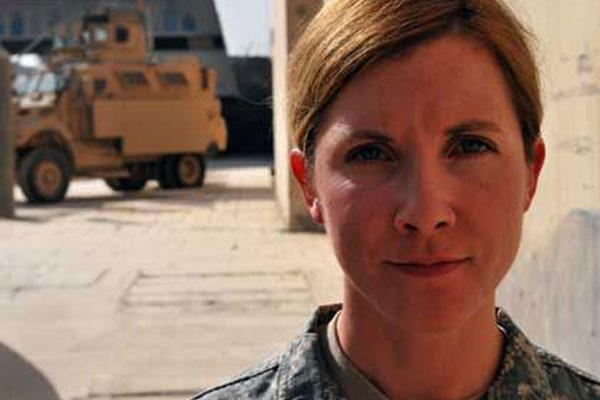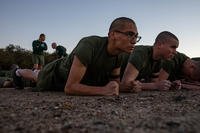Army Lt. Col. Kellie McCoy adopts the just-doin’-my-job poker face when asked about her combat time, but she stands out in history along with many other of the 280,000 military women who have served in Iraq and Afghanistan.
McCoy has served three tours in Iraq and one in Afghanistan. She knows what it feels like to kill on the battlefield. She earned a Bronze Star with Combat “V” in the process. Maybe most importantly, McCoy knows how to cram 11 paratroopers and their combat gear into a Humvee under fire.
All of that would set her apart from other uniformed women had so many other women not experienced similar situations the past 10 years of fighting in Iraq and Afghanistan. McCoy is part of the generation of women that convinced U.S. military leaders to make women eligible for combat roles for the first time in U.S. military history.
A West Point graduate who completed airborne school as a cadet, McCoy led 11 male paratroopers with the 82nd Airborne Division into combat in Iraq in 2003. The St. Louis native was a captain at the time.
Soon after a firefight off Highway 10 near Fallujah, she spoke to a reporter and gave full credit to her men for overcoming the ambush. McCoy explained how she led her men to concentrate fire in specific directions.
Ten years later sitting in the Pentagon, she thought about how she described the group as “my men.” Since Defense Secretary Leon Panetta announced that women would serve in combat, she realized how dated the term “my men” could soon be -- if it’s not already.
McCoy, 37, seemed surprised when it was pointed out that her example could serve as a rebuttal to critics who argue that women can’t lead men in combat, and men won’t follow. In 2013, she used the term “my soldiers” more so than “my men” when describing the firefight in 2003.
“Really, did I say that? Never thought about it,” McCoy said of the “my men” and “my soldiers” phrasing. “My soldiers didn’t think it was a big deal” of her leading them in battle. “I didn’t think it was a big deal.”
On Sept. 18, 2003, the third day in Iraq for McCoy, she commanded120 soldiers in the Headquarters Co. of the 307th Engineers Battalion in the 82nd Airborne Division. There may have been two or three women serving among the 120, but McCoy couldn’t recall any of them.
McCoy led 11 men, two Humvees, and two light trucks on a mission to visit her troops in other outposts when the convoy was hit by a well-coordinated attack of daisy chain roadside bombs and direct fire.
“The first IED went off right in front of my vehicle,” McCoy said. She ran her Humvee up and down the road to direct the fire of her troops, leaping out several times to fire her M4 carbine and M9 sidearm to repel the attackers firing automatic weapons and rocket-propelled grenades.
“I believe I hit two (of the enemy), but I don’t know how many we killed,” she said.
“The situation kept getting worse and worse,” she said. “That is where training kicks in. You don’t have time to consider everything that is going on. You’re just acting. I really do credit a lot of our training for that and making us prepared to just react in an appropriate way.”
Three of the four vehicles were disabled by the ambush. McCoy piled all 11 of her paratroopers into her Humvee and returned to base. Several of the troops had injuries, including concussions and ruptured eardrums, but none were life-threatening.
“We were probably quite a sight coming back through Ramadi,” McCoy said about her overloaded Humvee.
The citation for her Bronze Star with Combat “V” states that “Capt. McCoy willingly and repeatedly took action to gather up her soldiers under enemy fire and direct fire at the enemy. Her actions inspired her men to accomplish the mission and saved the lives of her fellow soldiers.”
If there were problems with her having command over men in her first tour in Iraq, McCoy said she couldn’t remember what they were. She had heard third-hand stories of men in her unit getting in fights with those in other outfits who said anything derogatory about her leadership.
A Gallup poll conducted over the weekend showed overwhelming support for the announcement Jan. 24 by Panetta and Army Gen. Martin Dempsey, the chairman of the Joint Chiefs of Staff, to end the ground combat exclusion rule banning women from the infantry, armor and Special Forces jobs.
Nearly three-quarters of Americans approved of the change, including 83 percent of Democrats and 70 percent of Republicans, the poll showed.
McCoy echoed Panetta and Dempsey in saying that the move simply acknowledged the evolution in the society and the military on the roles and status of women. The change would now allow her and other military women to compete for positions, if they can meet the requirements – physical and otherwise -- to qualify, McCoy said.
“When you think about it, the military’s always at the forefront of change in our society,” McCoy said of the military’s part in ending segregation and in scrapping the “Don’t Ask, Don’t Tell” policy that barred gays in uniform from serving openly.
The new policy for women “recognizes what is reality. I think the policy just reflects what has happened in a decade of war. It’s a reflection of where we are in our society,” McCoy said.
“Perhaps, I’ve contributed,” McCoy said of her own experiences. “What I did, what I’ve done, is not significant but maybe it’s a piece of what led to the policy change.”
“If you are capable and you can lead soldiers, it doesn’t matter whether you’re male or female, black or white, gay or straight -- you’re qualified,” McCoy said.
But the policy change won’t change her own view of leadership in the military, McCoy said.
“My job as your commander is to be a leader and to be fair. That’s what soldiers want -- they want to be treated fairly. It all boils down to leadership,” McCoy said.
The rule change was not subject to approval by Congress, but there was criticism on Capitol Hill, including disapproval from Reps. Tom Cotton (R-Ark.) and Duncan Hunter (R-Calif.), both veterans of Iraq and Afghanistan.
“What needs to be explained is how this decision, when all is said and done, increases combat effectiveness overall,” said Hunter, who served two tours in Iraq and one in Afghanistan as a Marine officer.
“There’s a difference between incidental combat, directly related to attacks against convoys or bases, and the direct combat duties of our advanced and most elite ground operators,” Hunter, a member of the House Armed Services Committee, said in a statement. “And in that respect, the idea that every combat mission and future conflict will mirror Iraq and Afghanistan is extremely shortsighted.”
Hunter is not the only Congressman to have served in Iraq or Afghanistan. Reps. Tulsi Gabbard (D-Hawaii) and Tammy Duckworth (D-Ill.) made history when they won their campaigns last November.
Gabbard and Duckworth are now the first women combat veterans to serve in Congress, and they were among a total of 12 Iraq and Afghanistan vets elected to Congress in November, nine of them Republicans.
Gabbard was a company commander with the 29th Brigade of the Hawaii Army National Guard and served as a medical operations specialist in Iraq in 2004. In 2009, she deployed again to Kuwait, where she helped train the Kuwaiti National Guard. She remains a military police captain in the Hawaii Guard.
Duckworth was an Army captain and lost her right leg near the hip and her left leg below the knee]when the UH-60 Black Hawk helicopter she was piloting was shot down in Iraq on Nov. 12, 2004. Duckworth, now a lieutenant colonel, remains in the Illinois National Guard.
"The decision to allow women to serve in combat will allow the best man or woman on the front line to keep America safe," Duckworth said in a statement Wednesday. "As a combat veteran, I know the inclusion of women in combat roles will make America safer and provide inspiration to women throughout our country."



























